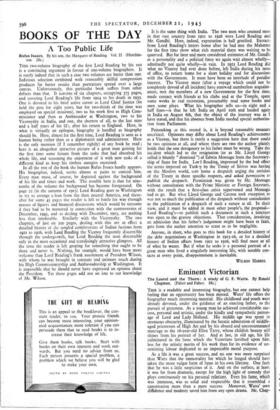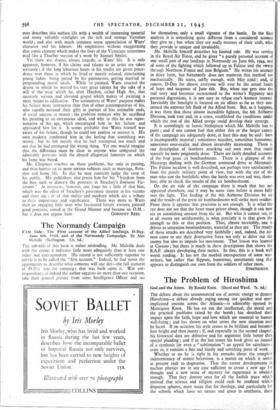Eminent Victorian
•
The• Laurel and the Thorn: A study of G. F. Watts. By Ronald
Chapman. (Faber and Faber. 18s.)
THIS is a readable and interesting biography, but one cannot help feeling that an opportunity has been missed. Watts' life offers the biographer much interesting material. His childhood and youth were already devoted, under the guidance of an exacting father, to the pursuit of greatness. As a young man he achieved considerable suc- cess, personal and artistic, under the kindly and sympathetic patron- age of Lord and Lady Holland. His middle age was spent in strenuous obscurity, illuminated by the fanatic admiration of middle- aged priestesses of High Art and by his absurd and unconsummated marriage to the i6-year-old -Ellen Terry, whose childish beauty stilt shines from his portrait of her. And at last, in old age, his life culminated in the fame which the Victorians lavished upon him, less for the artistic merits of his work than for its evidence of un- remitting labour dedicated to an impeccable moral purpose.
As a life it was a great success, and no one was more surprised than Watts that the immortality for which he longed should have taken the more vulgar form of fame in his own lifetime. One feels that he was a little suspicious of it. And on the surface, at least. it was far from dramatic, except for the high light of comedy that plays continuously on his personal relations. Even his fame, which was immense, was so solid and respectable that it resembled a canonisation more than a mere success. Moreover, Watts' own diffidence and modesty saved him from any open drama. Mr. Chap-
man describes this surface life with a wealth of interesting material and many valuable sidelights on the rich and strange Victorian world ; and also with much common sense appreciation of Watts' character and his labours. He emphasises without exaggerating that comic element which makes the lives of the Victorians sometimes read like a Thurber version of a work by Samuel Smiles. Yet there was drama, almost tragedy, m Watts' life. It is only apparent, however, if his claims and talents as an artist are taken seriously ; if the long laborious hours in his studio are given prece- dence over those in which he lived or merely relaxed, entertaining young ladies, being petted by his patronesses, getting married or propounding moral ideals. While he painted, Watts enacted the drama in which he wasted his very great talents for the sake of a will o' the wisp which he, after Haydon, called High Art, that intensely serious and elevated gospel which makes of painting a mere means to edification. The seriousness of Watts' purpose makes his failure more instructive than that of other contemporaries of his, who equally misused their gifts in pursuit of less estimable ends, of social success or money ; the problem remains why he sacrificed his painting to an extraneous ideal, and why in this he was repre- sentative of his age, which encouraged him in his failure and applauded him for it. It seems probable that Watts himself was aware of his failure, though he could not analyse or correct it. His own modesty confirmed him in the feeling that something was wrong ; but he felt merely that he had attempted too much and not that he had attempted the wrong thing. Yet one would imagine that the difference must be clear to anyone who compared the admirable portraits with the absurd allegorical fantasies on which his fame was based.
Mr. Chapman touches on these problems, but only in passing; and then hurries on to more serious subjects such as marriage, flirta- tion and home life. In this he may correctly judge the taste of his public. His publishers also praise him for his "freedom from the bias . such - as distorts the portraits in Strachey's Eminent Vic- torians." At moments, however, one longs for a little of that bias, which was the effect of Strachey's passionate interest in his victims and their age ; or of that malice and mockery which are a tribute to their importance and significance. There was more to Watts than an engaging little man who fascinated female visitors, painted good portraits, aimed at the Grand Manner and became an O.M. ;































 Previous page
Previous page